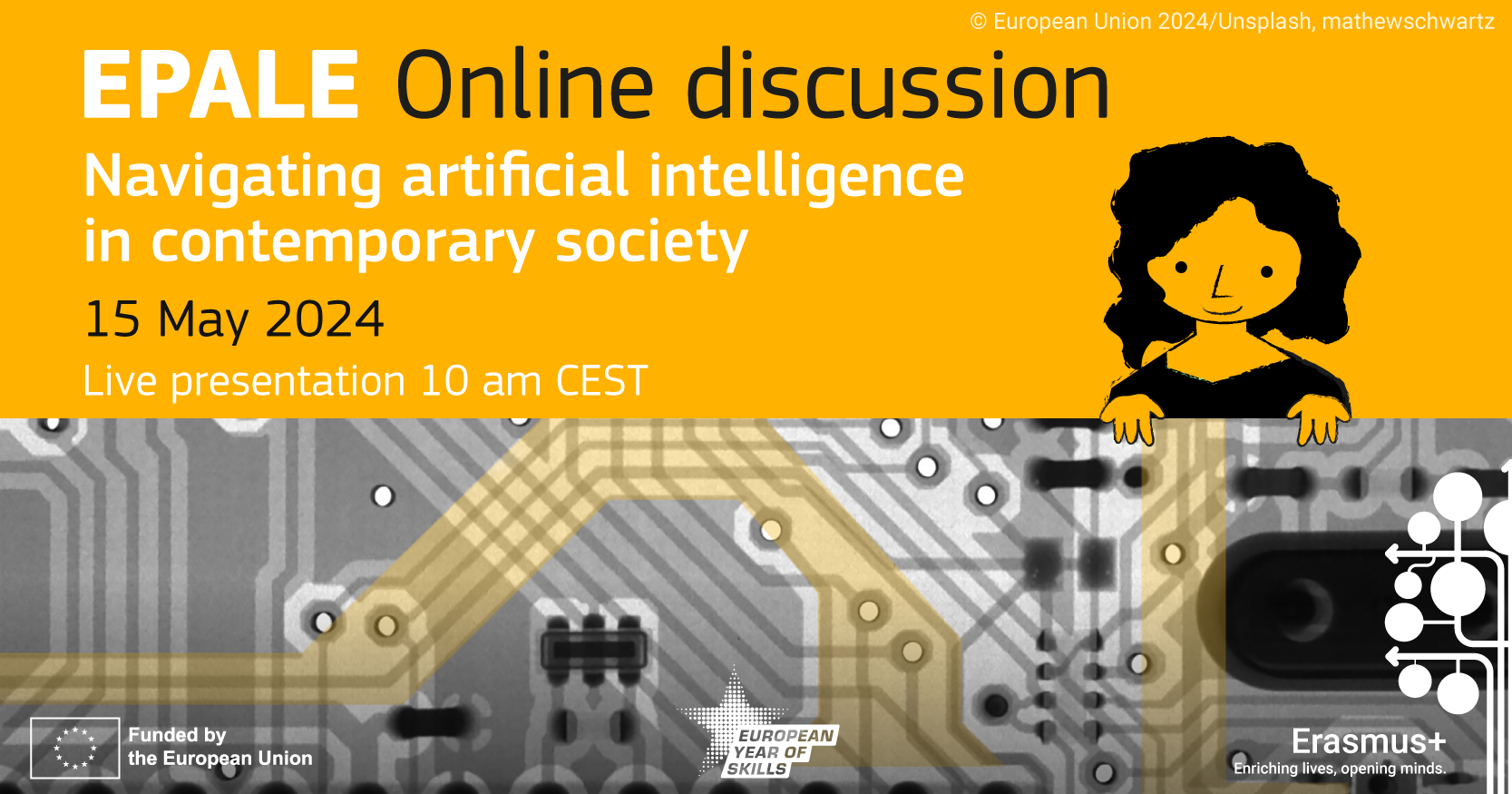Készüljön fel a következő EPALE beszélgetésre: „A mesterséges intelligencia vezérlése a kortárs társadalomban”

2024. május 15-én, szerdán, közép-európai idő szerint délelőtt 10:00-kor adunk otthont a „A mesterséges intelligencia vezérlése a kortárs társadalomban” című online beszélgetésnek.
A beszélgetés egy élő közvetítéssel kezdődik, amelyben Steph Wright, a skót AI Szövetség vezetője és Christoph Bretgeld, a SkillLab társalapítója vesz részt, a moderátor pedig Christin Cieslak lesz az EAEA-tól.
Az élő közvetítést moderált írásbeli beszélgetés követi, amely lehetőséget teremt az EPALE közösség tagjai számára a hozzászólásokra.
A beszélgetés apropója
A beszélgetés során a mesterséges intelligencia egyénekre és közösségekre gyakorolt hatásaival foglalkozunk, és arra összpontosítunk, hogy az AI-stratégiák hogyan tudnak reagálni a társadalmi igényekre. A mesterséges intelligencia társadalmunkban betöltött jelentőségének feltárása során megvitatjuk a kormányok, a civil társadalmi szervezetek és a nemzetközi testületek közötti együttműködési megközelítéseket annak érdekében, hogy helyi, nemzeti és globális szinten biztosítsuk a felelős mesterséges intelligencia fejlesztést.
Az alábbi kérdésekre keressük a választ az online beszélgetés során:
- Hogyan hathat pozitívan a mesterséges intelligencia a közösségekre és az emberekre?
- A technológia változásával hogyan tarthatjuk rugalmasan az AI-stratégiákat?
- Hogyan tehetjük az AI-projekteket méltányossá a marginalizált csoportok számára?
- Hogyan működhetnek együtt a kormányok, a civil társadalom és a nemzetközi szervezetek a mesterséges intelligencia felelős használatának biztosítása érdekében világszerte?

Megjegyzés
Good morning! Thank you very…
Good morning!
Thank you very much for this online discussion focused on topics that should concern us all today.
I believe that Artificial Intelligence is still taking its first steps and that it will be, in the upcoming decades, a revolution in several dimensions of our lives. One of these dimensions will certainly be education and in particular adult education.
AI has the potential to integrate and help each of us understand how we can learn more or faster, but of course there is a danger of leaving out (or further behind) those who are not capable of using the devices to which AI will be linked.
In any case, it will be extraordinary to have the possibility to ask a machine to analyse the way each of us learns, based on our routines, and to present us with tools to learn according to who we are.
I think that, in the future, each of us will be able to learn better throughout our lives with IA, because there are not always formal or informal structures to provide the learning we need (at least, in Portugal). It is very likely that informal education will be the main form we will use to learn throughout our lives, after having completed our initial training.
In the future It will be possible to ask a device (just as we ask Alexa today to play us a song) to tell us how we can improve this or that skill and to help us along this path of improvement.
Furthermore, I hope that, in the future, AI will free me from tasks that I have to do today in order to have time to learn more and to explore new areas of knowledge.
In that sense, I think AI will allow us to have a better life but, in fact, this better life needs to be for everyone.
- A hozzászóláshoz regisztráció és bejelentkezés szükséges
AI in contemporary society
Now, there is an intriguing topic for debate.
Personally, I am interested in ethics of AI, followed by "positive impacts" of this technology and concrete use for marginalized groups - are there any?
- A hozzászóláshoz regisztráció és bejelentkezés szükséges
Discussion's page
Dear Ivan,
Many thanks for your interest!
Make sure to tune in to the discussion page later today!
Sara - EPALE Team
- A hozzászóláshoz regisztráció és bejelentkezés szükséges





Ważne!
w tym kontekście warto zawsze zastanowić się, jak nie dać się oszukać sztucznej inteligencji? - analizując wyzwania związane z coraz bardziej zaawansowaną technologią AI, która zdobywa popularność. Jak w tym wszystkim ma się krytyczne rozumienie mediów? czy nasza rosnąca zależność od technologii nie prowadzi do spadku umiejętności krytycznego myślenia?